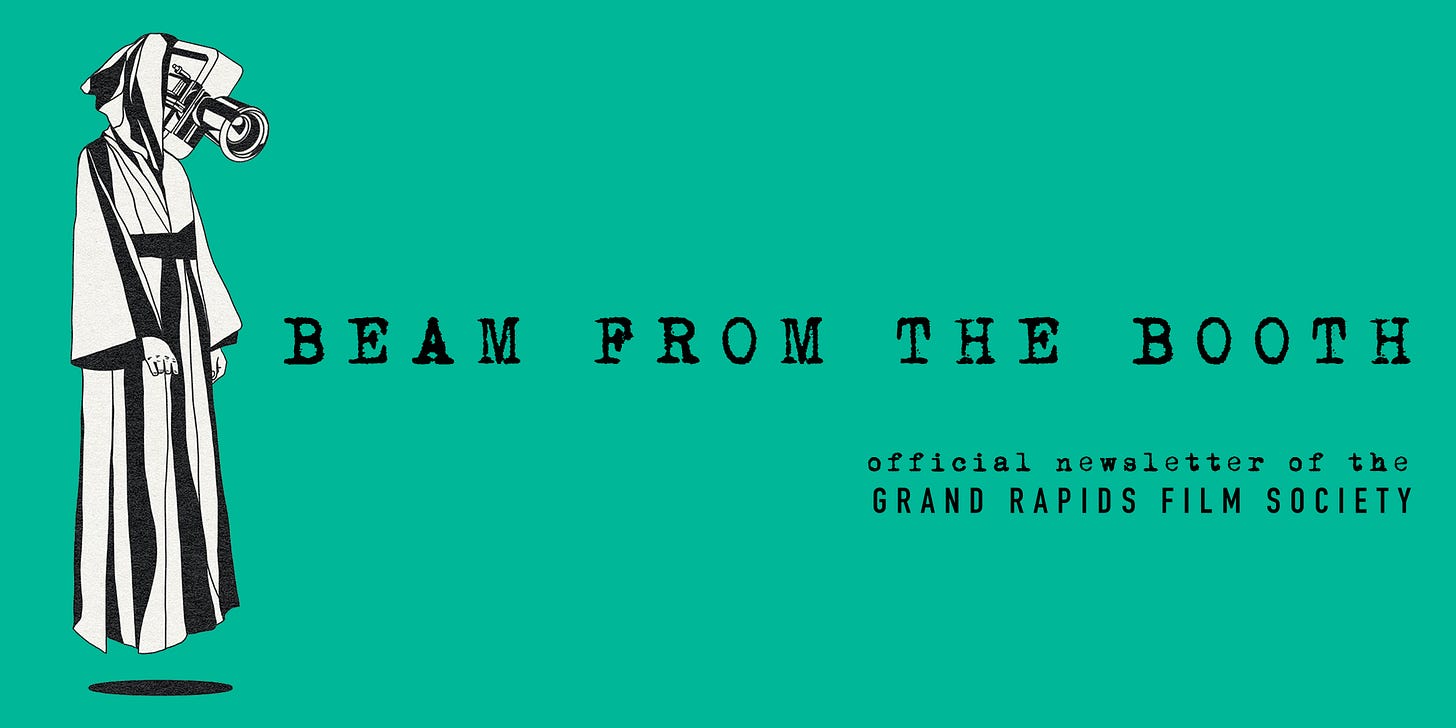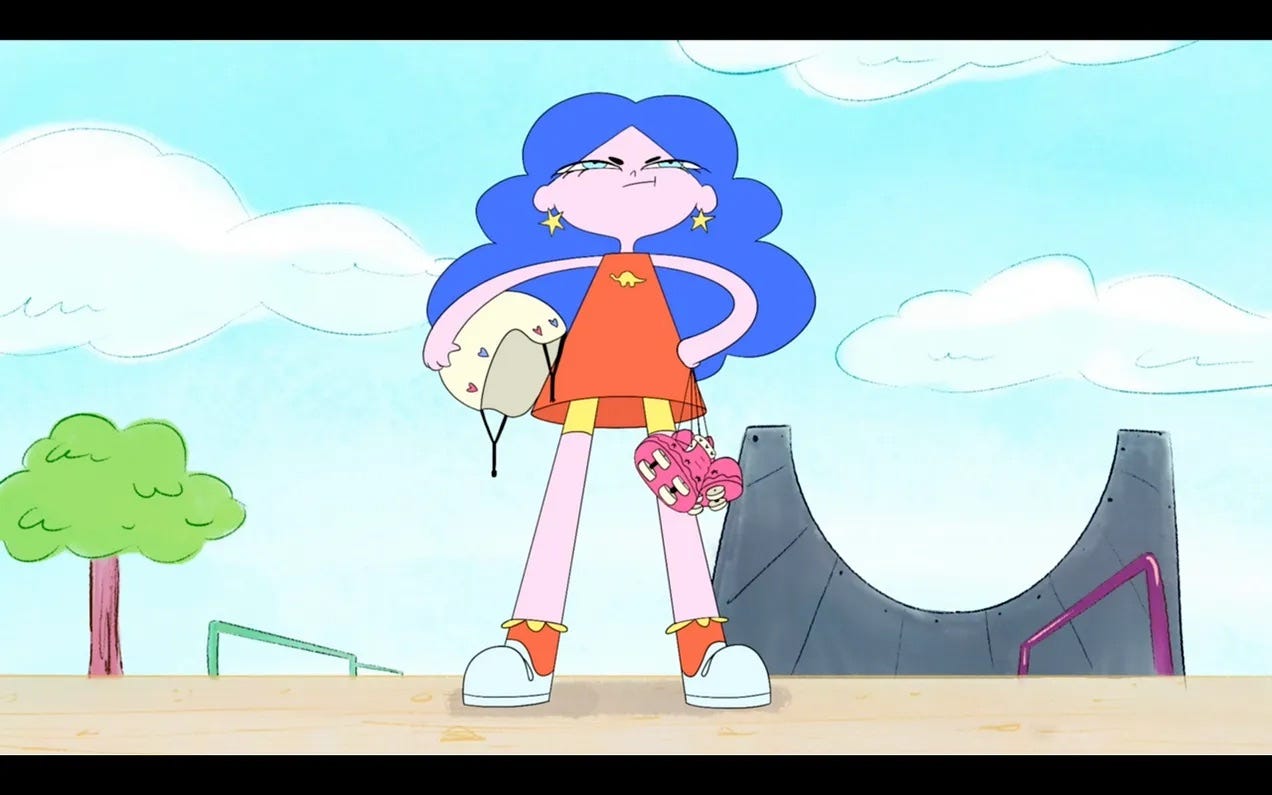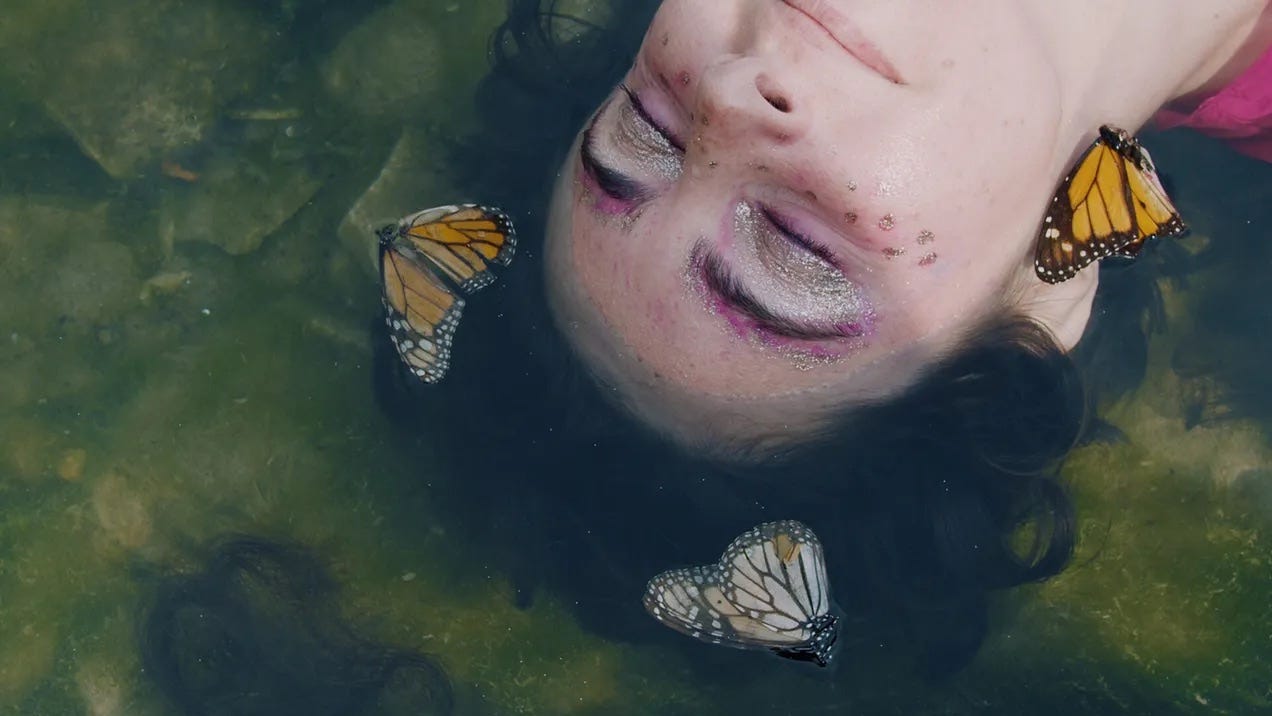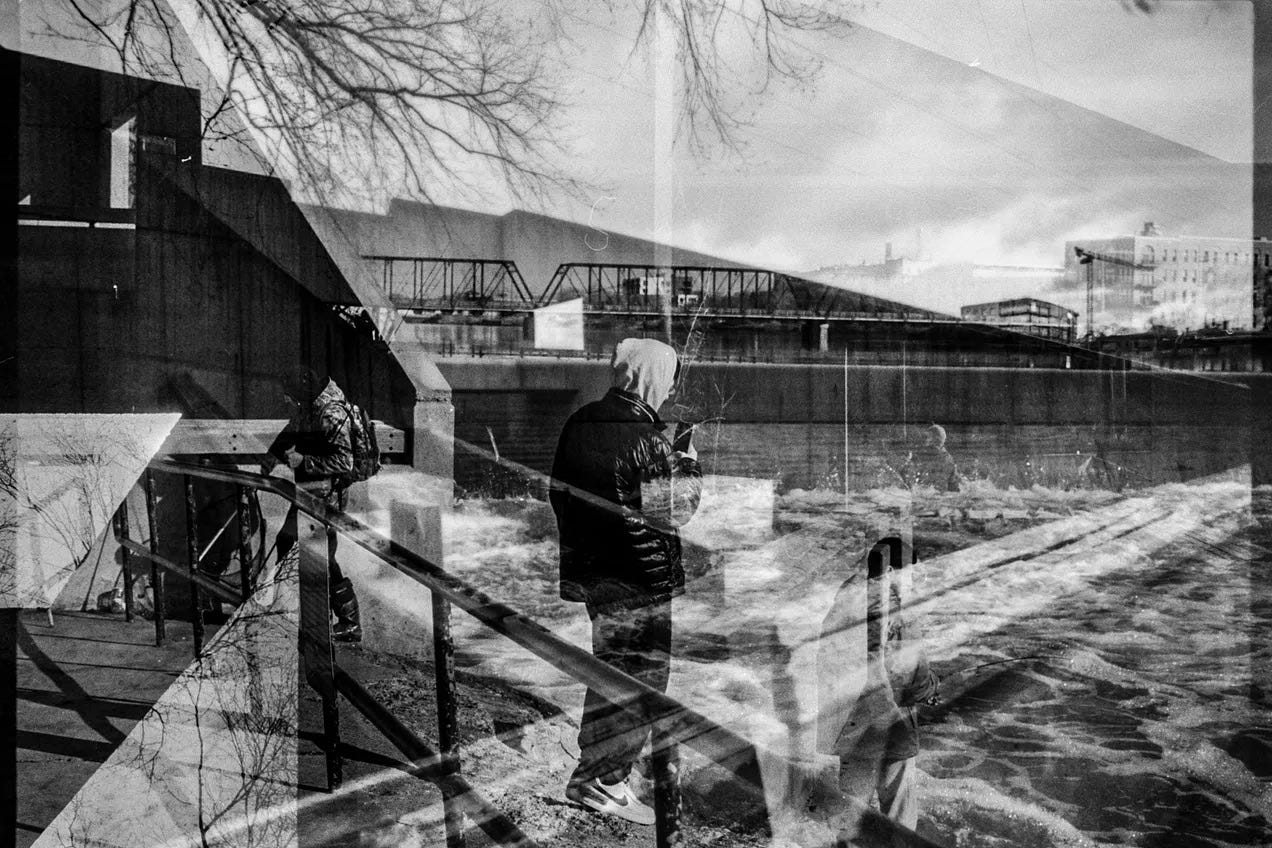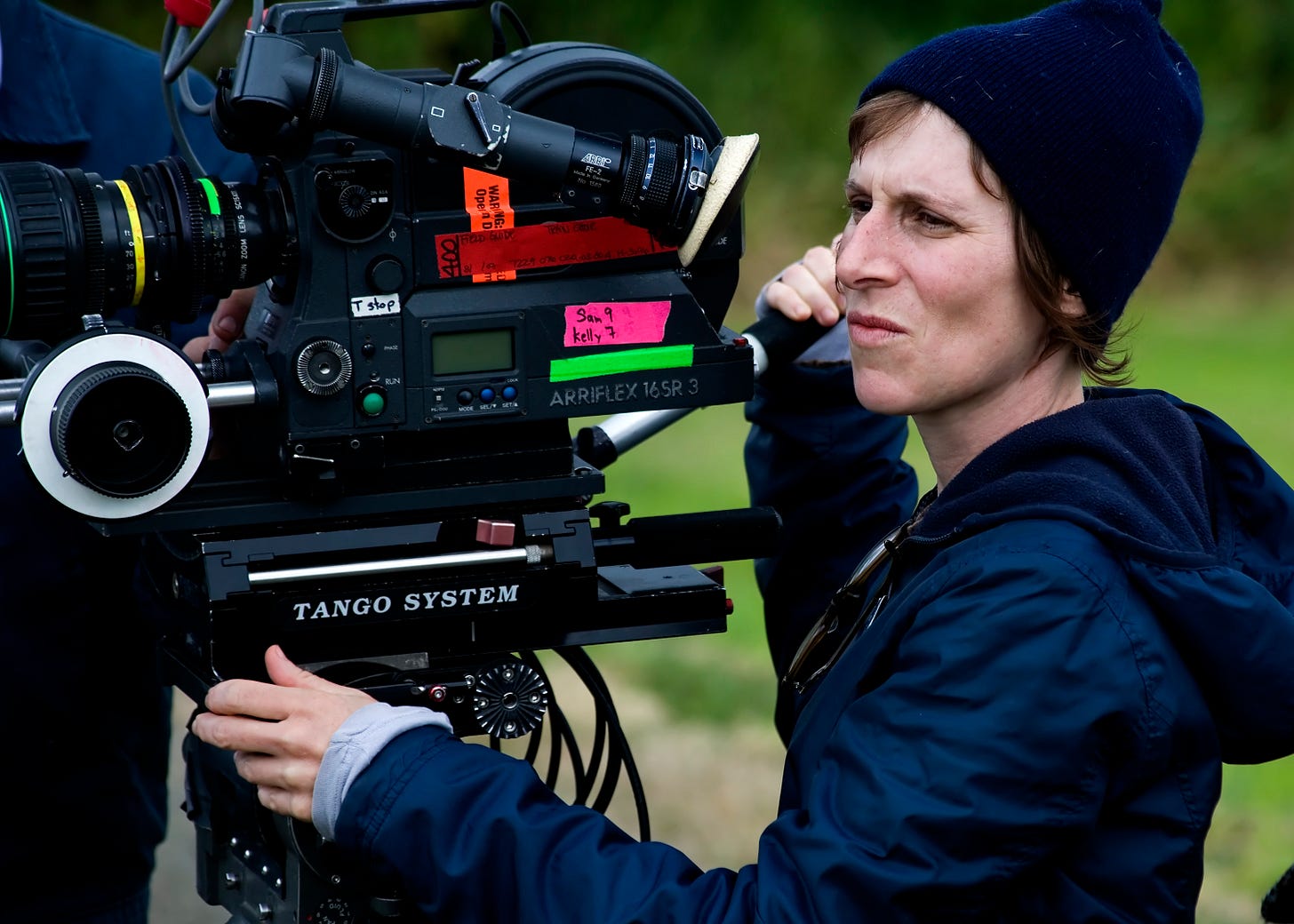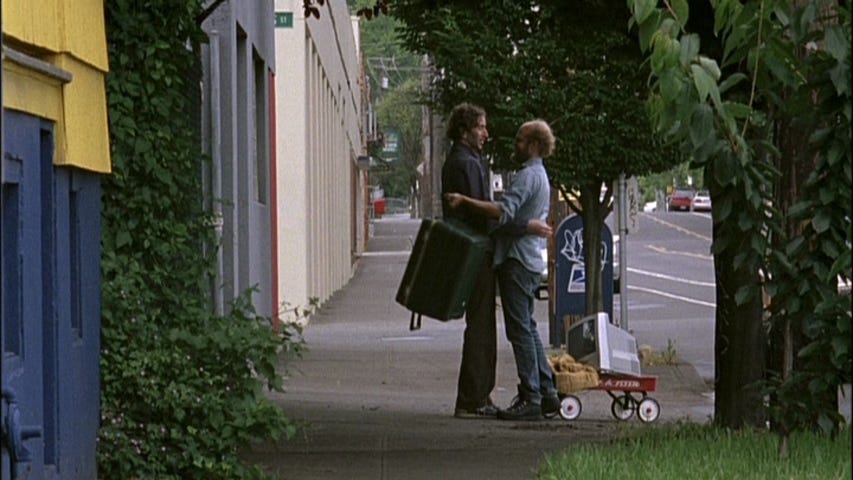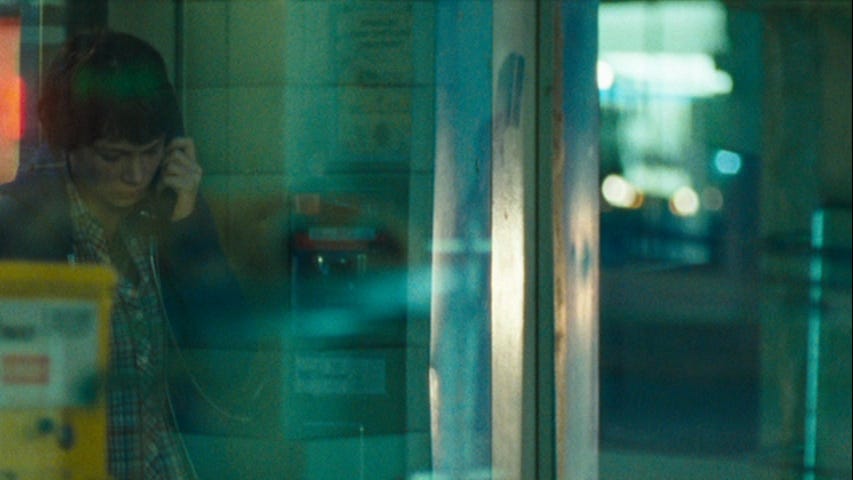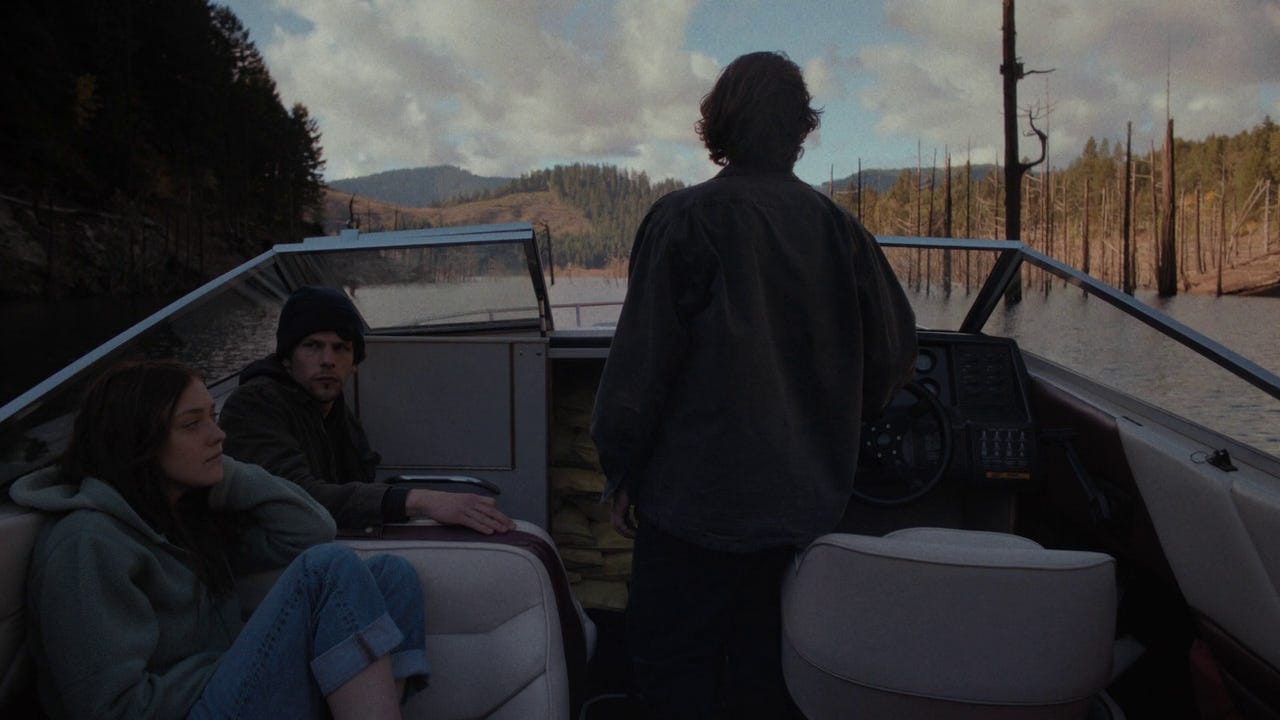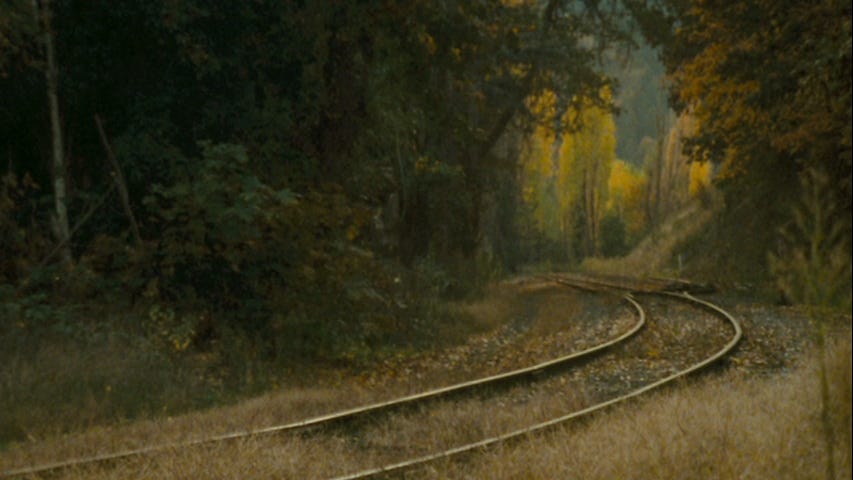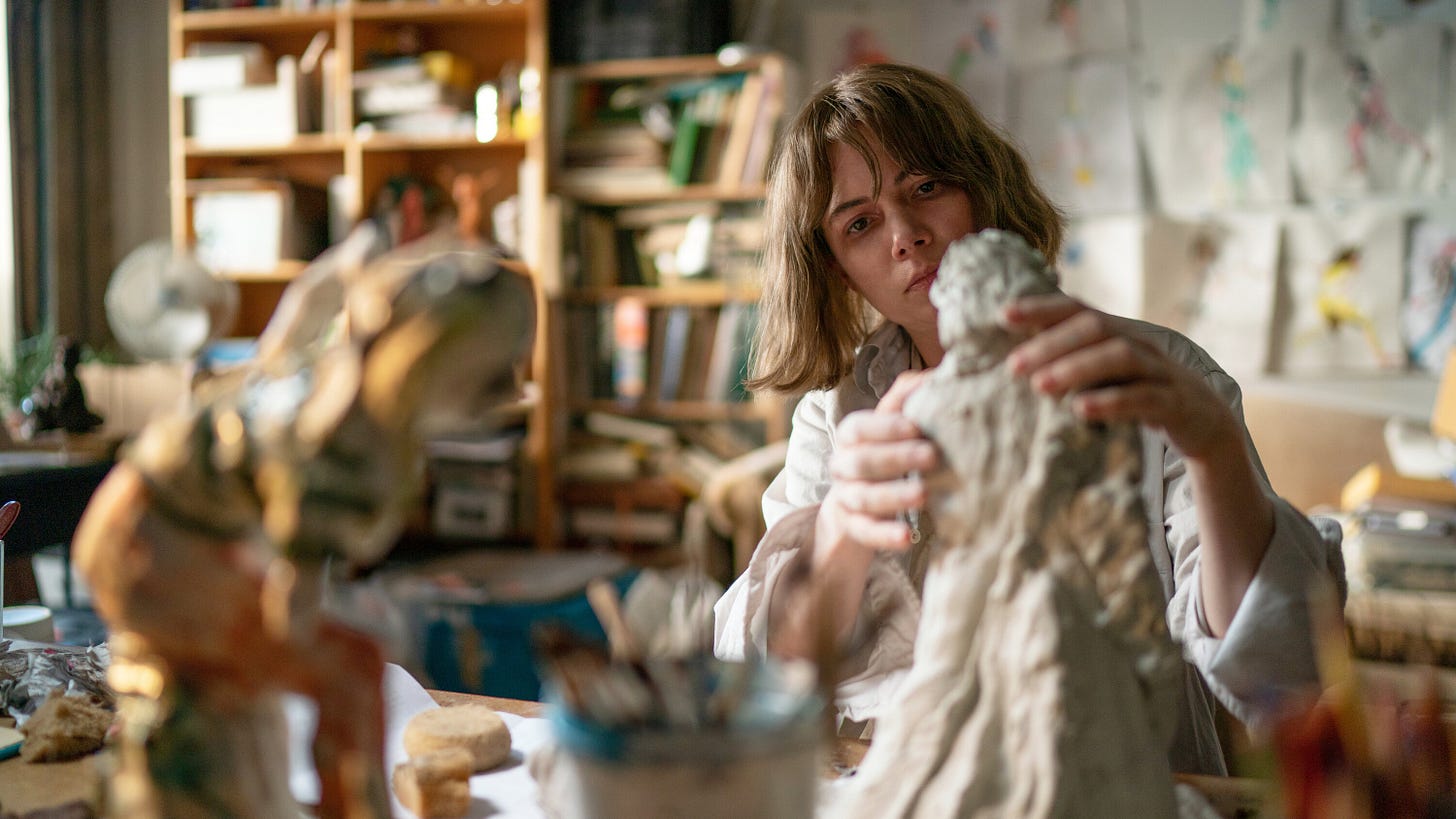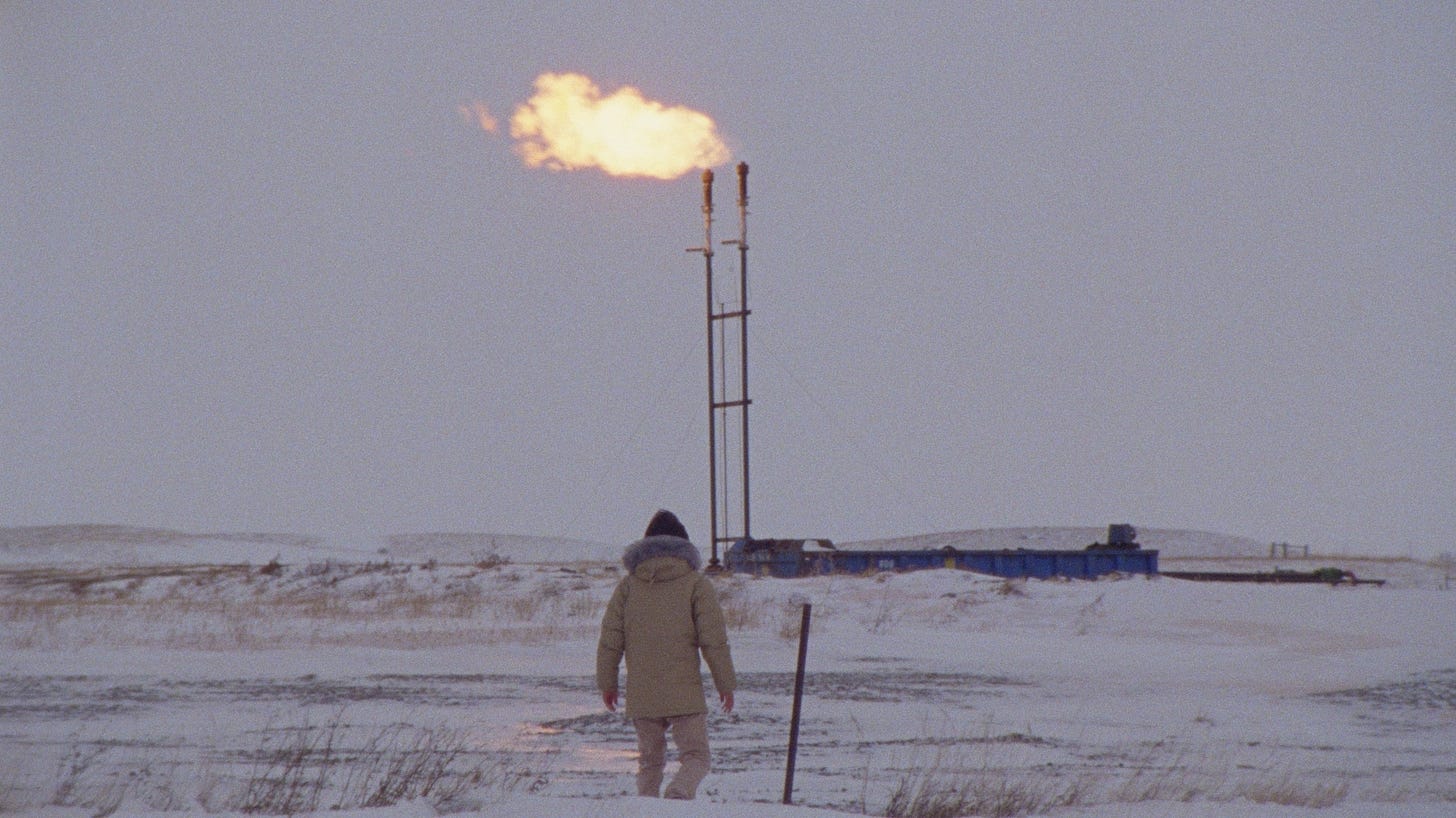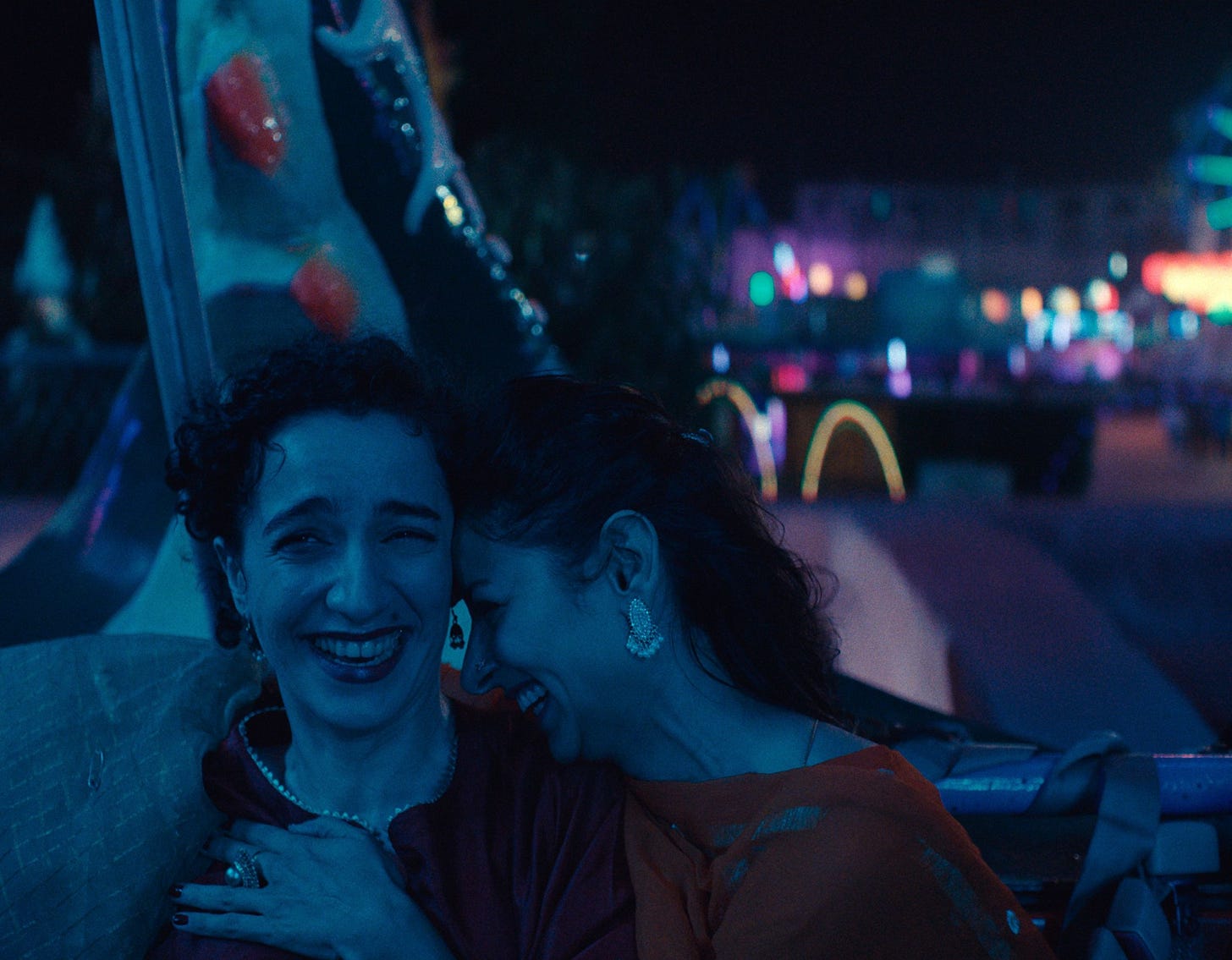[EDITED BY: GRIFFIN SHERIDAN]
Welcome to an all-new installment of BEAM FROM THE BOOTH, brought to you by GRAND RAPIDS FILM SOCIETY!
Let’s start with a huge congrats to the winners of our most recent OPEN PROJECTOR NIGHT, which we held this past Wednesday! Check out the stills for each of our winners below...
Thank you to everyone who came out to support local independent filmmakers. If YOU or someone you know is interested in submitting for our next Open Projector Night, you can do so starting now, until July 19th, on our FILM FREEWAY page. Our next event is currently scheduled to take place on WEDNESDAY, AUGUST 16th. Mark your calendars!
Speaking of upcoming events, our special WEST MICHIGAN PREMIERE screening of Kelly Reichardt’s latest work, SHOWING UP, is just under a week away. To celebrate, we have put together a very special issue of the newsletter centered around Reichardt’s work...
GRFS SYMPOSIUM: KELLY REICHARDT
Without a doubt, Kelly Reichardt is an American treasure. Over the course of nearly three decades and eight feature films, her immense talent is undeniable, and she has established herself as a remarkably consistent voice in independent cinema — always outside the mainstream yet attaining cultural stature and admiring recognition along the way. Among her many strengths as a filmmaker, Reichardt possesses a rare ability for composed framings and rich soundscapes, crafting atmospheres that draw us in (and sometimes lull us) to guide our attention to observe details and gestures that most other writer/directors overlook. Frequently collaborating with writer Jonathan Raymond and cinematographer Christopher Blauvelt while serving as editor herself, she has built a filmography that — from many angles — adds up to a perceptive portrait of America, past and present; not just simply for her images replete with painterly landscapes but also her stories that are always carefully attuned to the anxieties of characters and their specific milieus. Her cinema can be humble, minimal, and gentle (even delicate at times), but it never lacks for force.
The Grand Rapids Film Society is proud to present this celebration of Reichardt’s career in anticipation of our screening of her excellent new film, Showing Up, and we hope these reflections offer entry points for the uninitiated and new perspectives for those already familiar with the work of this extraordinary artist.
— SPENCER EVERHART
OLD JOY (2006)
I shall be telling this with a sigh
Somewhere ages and ages hence:
Two roads diverged in a wood, and I—
I took the one less traveled by,
And that has made all the difference.
“The Road Not Taken” by Robert Frost
I can’t help but think that Kelly Reichardt was at least partially inspired by Robert Frost’s poem when she wrote and directed Old Joy — a hypnotic, meditative, and ambiguous film about two old friends who go on a hike in the woods. The naturalistic and compelling performances from Will Oldham and Daniel London blend perfectly with the lush and isolated Pacific Northwest forests captured on 16mm celluloid. It’s the cinematic equivalent of laying down on a mossy forest floor and reflecting on your journey with an old friend.
Perfectly paced, impeccably shot, and brilliantly directed, Old Joy instantly became a favorite of mine. Oldham’s monologue at the climax of this movie is a masterclass and left me with my jaw on the floor. The choice to capture such tragic human feelings in such a beautiful natural environment works so well because, as painful and uncomfortable as those feelings are, they’re human nature.
— JACKSON EZINGA
WENDY AND LUCY (2008)
Wendy and Lucy is a movie that hits really close to home for me. There are so many things the majority of Americans relate to that I bet others feel the same. After the credits rolled the first time I saw it, I sat in silence unsure of how to feel, what to do, or where to go next. I was sad, but not in the kind of way where you are so overwhelmed with feelings after a film that you cry. It was more existential — so real that I felt frozen in time.
In the most basic sense, the movie is about a woman, Wendy, and her dog, Lucy. That alone hits home because my dog, Copper, and I have been sole companions for five years now. In those five years, many things have changed: many people have left, locations have changed, but Copper and I stayed consistent. He is one of my best friends, just like Lucy is Wendy’s. The other aspect that I related to is the view of poverty that Reichardt shows us. Wendy lives in her car, she doesn’t have enough money to buy dog food; she can’t even take care of the one thing that matters to her most.
When Wendy loses Lucy, that hit me hard. It was my own worst fear being presented right in front of me. So many thoughts go through your head when you can’t find the thing that’s most important to you: are they okay? What if they ran out into the road? What if someone hurt them? What if they starve to death? Will my heart feel this heavy forever? I felt like I had lost Copper (which is quite comical because he was laying right next to me on the couch as I anxiously watched Wendy search for her best friend).
When she finds Lucy, I was relieved. They have been reunited. Yet, Wendy does something so selfless I can’t even imagine trying to make such a decision: she leaves Lucy somewhere that can take better care of her than she can. It’s a big responsibility to have a pet — to say you can not only take care of yourself but another living being.
That is my biggest fear: that I break my promise to Copper, the promise that I can not only love him but take care of him. Kelly Reichardt wrote such a beautifully sad representation of that fear...all the while commenting on the poverty that consumes most of America.
— BREANA MALLOY
MEEK’S CUTOFF (2010)
On a cold winter night in February 2012, I was scrolling through whatever streaming video channels I subscribed to at the time — I think it was Hulu, it might have been Netflix. I was in the mood to watch something new. I stumbled across a tile promoting a movie called Meek’s Cutoff. The image showed a young woman holding an old fashioned rifle, apparently aiming it at something, or more likely someone. “Hmm,” I thought to myself, “a Western, recently released, based on a historical account about settlers heading out on the Oregon trail. Looks kind of interesting.” A moment later, I stopped browsing and committed myself to check out whatever this film had in store.
That was my first introduction to the work of Kelly Reichardt. Now, I’ve watched a lot of random streamers over the years, before and after, but this was a viewing experience that stuck in my memory — one of the more fortuitous discoveries of a new and subsequently favored director that took me totally by surprise. Even though I was settling down to presumably enjoy the reliable comforts of the Western film genre, from that perspective I didn’t necessarily get what I was expecting. Yes, there are many conventional elements offered up on screen: hardy pioneers in a wagon train making their slow procession across a dry and desolate prairie; tensions generated by the potential for dreadful encounters with hostile Natives poised to take ruthless advantage of isolated travelers; gorgeous cinematography capturing sun-drenched wide open spaces; the core drama of courageous settlers working through myriad challenges stirred up in their encounter with indifferent forces of nature and the conflicts that ensue as they try to avoid cracking under pressure. But the way Reichardt strips away the narrative gloss, refrains from the usual cues of emotionally evocative, programmatic soundtrack music, and — most especially — departs from predictable formulaic plotting (or even clever subversions of the familiar tropes)...I understand that this may not be a formula that connects with every viewer, but I was easily drawn in and persistently engaged with this low-key contemplative study of characters under intensifying degrees of duress, both physical and mental.
The story of Meek’s Cutoff can easily be summarized: a trio of covered wagons under the leadership of a supposedly seasoned and trustworthy trail guide named Stephen Meek find themselves in a dire situation when their leader turns out to be gravely mistaken in his effort to take them across a shortcut on the Oregon Trail. His navigational error lands the travelers in an arid waterless landscape with no relief visible across the vast horizon that confronts them. The survival of this mixed company (men, women, one of them pregnant, and young children) is at risk. Hard decisions have to be made, so much hinging on whether or not to continue trusting the guide who got them into this predicament, with no guarantees that their choices will prove successful; add in the element of an encounter with an enigmatic Indigenous man who might help them get through the wasteland or who might be simply biding his time until he can meet up with enough of his fellow tribe members to mercilessly slaughter the troupe. It all adds up to some pretty gripping tension, for me at least. But it has to be said: the quiet, understated mode of Reichardt’s delivery might fail to hold the attention of viewers more accustomed to being jolted by loud eruptions when conflicts come to a head, and being satisfied with resolutions much more concrete than what Reichardt chooses to provide.
It’s her reticence to indulge in obvious crowd-pleasing maneuvers that allows once-muted voices and subtler perspectives to emerge from the margins into the forefront of her contemplative, minimalist narratives, not only in this film but in pretty much all of the others that I’ve seen from her (I’m not completely caught up on her work, but it’s only a matter of time). Reichardt has already established herself as a compelling and quietly adventurous filmmaker, one that I’ll eagerly follow wherever her inquisitive explorations may lead.
— DAVID BLAKESLEE
NIGHT MOVES (2013)
On its earth-toned surface, Reichardt’s 2013 film about a trio of environmentalists attempting to blow up a hydroelectric dam might appear to be her most conventional. Indeed, the initial response at the time of its release was positive overall, but many reactions were a bit muted compared to her previous efforts, and some carried a tinge of disappointment for how the filmmaker had seemingly moved into more mainstream territory. Looking back on it now, one wonders if this was mostly due to inflated expectations after the fairly rapturous reception to Meek’s Cutoff (a movie that makes very few concessions to the casual viewer). While Night Moves does display the markers of a more commercial project — thriller plotting, overt topical relevance, famous star performers — it is still very much a Kelly Reichardt film in approach: genre elements are deployed in a low-key manner, political commentary is suggested more than outright stated, and a post-Social Network Jesse Eisenberg as the lead is less verbose than ever in a wonderfully interiorized performance that showcases a talent for expressive body language (his eyes are the real star here).
With this subject matter, Reichardt’s primary interest is in the moral cost of the characters’ decisions so it’s interesting to view Night Moves as a subtler, atmospheric precursor to How to Blow Up a Pipeline (Daniel Goldhaber, 2023), which draws similar inspiration from 1970s thrillers and heist flicks but ramps up the intensity and maintains a focus on planning, process, and execution. If we indulge a little auteurist ‘progression,’ though, it’s not hard to see how Reichardt might have arrived here — Will Oldham’s character in Old Joy cites environmental concerns by comparing the garbage piling up in both cities and forests; Wendy and Lucy starkly observes the daily oppression of Great Recession-era poverty; trials of colonial expansion unsettle the filmic frontier history of America in Meek’s Cutoff. It makes sense to follow these politically-charged contexts, increasingly fraught in the 21st century, with a study of radicalized folks taken to drastic action. With this in mind, Night Moves reads as an extension of what critic Kristi Mitsuda has perceptively noted about how: “…Reichardt grasps and gives voice to a basic but strangely underrepresented notion that the political is personal, indivisible from our everyday ways of engaging with the world.”
Even with a more straightforward narrative structure that tones down the usual spaciousness of her style, Reichardt’s keen eye for detail still fills in the gaps and brings this world to life. The community agriculture farm where Eisenberg’s Josh lives and works feels totally authentic and lived-in. Possibly incriminating mud on a boot is captured in quick close-up, ratcheting up the tension one more notch and reminding us to consider the little things. A trip to the store for explosive fertilizer is staged in exactly the kind of shopping place you’ve probably visited yourself, which is to say the overwhelmingly ordinary kind you hardly ever see in movies. When Dakota Fanning holds up a cheap crystal necklace in a darkened room, light refracts through the stone creating colored shards all around, transforming the visual texture of her body and the space (while also revealing a looming threat in the shadows). Such precise attention is paid to sound design as well, especially in the grainy sonic quality of phone conversations heard through a mobile receiver — distorted yet immediate; the way this alters Peter Sarsgaard’s already unnerving voice becomes more and more menacing with each call. Night Moves is not without dark humor too, and it contains maybe the funniest moment in Reichardt’s career when a sudden transition from one scene to the next abruptly cuts off a moderator’s perfunctory waffling during a Q&A for an eco-documentary.
All of these measured observations lead into a paranoid last stretch, culminating in an unexpected closing shot. This final framing is something like a Reichardt trademark, a glance that at first is so specific and ordinary it might feel tossed off — a transitional insert shot — but in her hands is far richer and portends much more. A sudden cut to black activates the image: ambiguous but stirring, it speaks volumes despite its seeming mundanity. By this point, a significant character has lost their way, reluctantly retreating back into a societal fold they despise. They will likely always be looking over their shoulder, wary of being watched, fighting the sinking feeling that wherever they look, someone else is staring back...even if (or especially if) it is a mirror. Night Moves was Kelly Reichard’s first movie to be shot digitally, but it concludes with an instance of distinctly analog surveillance.
— SPENCER EVERHART
CERTAIN WOMEN (2016)
My first time watching Certain Women was in January 2021. My recollection of the storyline was slim to none. So when I sat down to watch it this past weekend, I didn’t look at my Letterboxd review or talk to friends about it — I just sat down and pressed play. When comparing my first review and my recent experience, there was a vast difference in my understanding of the film. To me, Certain Women is a film I can watch in different moments of my own life and find new meaning in each viewing.
The first of the three tales follows Laura (Laura Dern), a lawyer, as she deals with a client who is unable to accept his case is dead. My first viewing showed me that she was brave and strong as she handled a tough situation. However, when I watched it recently, I saw that she wasn’t so different from her client: lonely, worn down, and lost. In my original viewing, I myself was looking for strength as a woman in a male-dominated field. I wanted to feel inspired by Laura, to get something from her. Now, I am not looking to take something from a character, but I actually see my own experiences in them. The feelings of loneliness and isolation that Laura and her client have are palpable. You see it all through body language and the words left unspoken.
After a scenic shot of the Montana landscape, we are introduced to Gina and Ryan (played by Michelle Williams and James LeGros), a married couple building their dream home. Three years ago, I saw a failing marriage. I felt that they were just complacent in their roles and would rather be unhappy together than be alone. Now I see the couple is in a rough patch. They are essentially trying to rebuild their lives. Originally, I saw the issues in the relationship and deemed it dead on arrival, but I now see a relationship that needs work but can still make it. I now know the work they must do — it is hard but not impossible.
The last of the stories follows Beth (Kristen Stewart), a lawyer teaching a night class, and Jamie (Lily Gladstone), a ranch hand who wanders into Beth’s class. Upon first viewing, I saw determination in Jamie and her pursuit of Beth. I didn’t think much about how, in the end, Beth rejects her. That very moment now shows me that it is just one more disappointment in Jamie’s life. She finally begins to stop suppressing her feelings, and her subtle pursuit pushes her right back down.
Although these are all personal observations, it is clear that Kelly Reichardt wrote a screenplay with such depth that there is always a new layer to unfold. She doesn’t shove a theme down your throat or tell the audience how to feel. She shows you a person, their relationships and their habits, and she lets you experience them. I truly believe that's why I can find vastly different meanings in the film only a few years later. I’ve grown as a person and the film grew with me because there is no one theme, meaning, or interpretation being forced on you. You sit with seemingly real people and simply see what you will in them.
— BREANA MALLOY
FIRST COW (2019)
Being able to look at Kelly Reichardt’s filmography as a whole, some career-spanning themes start to become apparent: enduring friendship, a love of nature, and surviving amongst peril stemming from the previous two themes are all things that can be found throughout her work. First Cow hits on all of those, but it also starts another conversation by calling into question the ethics of American capitalism. The two lead characters have a passion, an ‘American dream’ that is supposedly the calling card of this country, and yet they cannot pass the barrier for entry because of their status in society both socially and economically. They are forced to steal from those who are so careless with their wealth they don’t even notice they are enjoying the fruits of it when Cookie (John Magaro) and King-Lu (Orion Lee) make cakes from the milk they’ve stolen from wealthy class’ cow (Eve the Cow). “America is a land of abundance,” they say, yet that abundance seems to be in the hands of a select few — leaving the rest of us in the dirt. But beyond their powerlessness, Cookie and King-Lu have each other and their enduring friendship, and Reichardt is perhaps the most well-equipped filmmaker we have to depict the sensitive and loving nature of their partnership; an absolute master.
— SAM MCKENNEY
You can find options for streaming these films HERE.
GRTV VOLUNTEER PRODUCTION OPPORTUNITY
GRFS is always on the look out for opportunities to share with the community of folks looking for production work, and our friends at GRTV have a really great one coming up…
Interested in getting more camera/production experience? Come volunteer with GRTV! They still have a few spots left for Camera Operator at this year's Calder Multi-Cam live TV production at Festival of the Arts happening next weekend June 2nd-4th!
[CLICK HERE FOR SIGNUP LINK AND INFORMATION]
UPCOMING EVENTS
SHOWING UP (Reichardt, 2022)
WHAT: WEST MI PREMIERE! Master filmmaker Kelly Reichardt’s latest work, from A24.
WHEN: Thursday, June 1st, 8:00 pm.
WHERE: The Wealthy Theatre
HOW TO BLOW UP A PIPELINE (Goldhaber, 2023) + Q&A
WHAT: A screening of the incendiary new film, plus a GRFS exclusive recorded Q&A with the filmmakers!
WHEN: Thursday, June 8th, 8:00 pm.
WHERE: The Wealthy Theatre
JOYLAND (Sadiq, 2023)
WHAT: Haider lands a job at a Bollywood-style burlesque, where he is a backup dancer and becomes infatuated with a strong-willed trans woman.
WHEN: Wednesday, June 21st, 8:00 pm.
WHERE: The Wealthy Theatre
And so we’ve arrived at the end of another BEAM FROM THE BOOTH! We appreciate you taking the time to read it and truly hope you’ll continue to do so. Be sure to SUBSCRIBE to get each issue in your inbox every FRIDAY and stay up-to-date on all things GRFS!
Plus, join us on social media! We’d love to chat with everyone and hear YOUR OWN thoughts on everything above (you can also hop in the comments section below).
Know someone you think will dig BEAM FROM THE BOOTH? Send them our way!
Look for ISSUE #17 in your inbox NEXT FRIDAY, 6/2!
Until then, friends...



